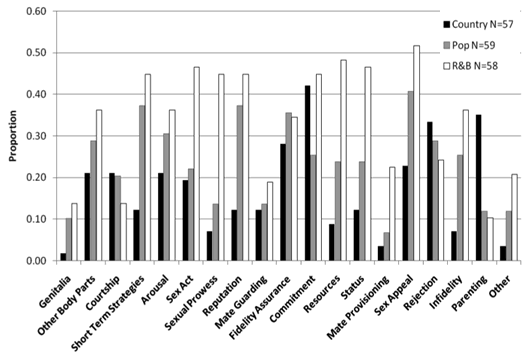UAlbany study: 92% of top 10 songs mention sex

"Distribution of reproductive themes for 2009 songs as a function of song type" (edited). To quote noted reproductive phrase messenger 50 Cent: I got the (genitalia reference)/ I know if I can (sexual prowess reference)/ I hit the (sex appeal reference)/ Shorty don't believe me, then (short term mating strategy reference).
UAlbany professor Gordon Gallup must have the sexiest lab on campus, what with all the research on interpersonal attraction, semen chemistry, voice attractiveness, kissing, and other topics that stick out.
In a paper published last month in the journal Evolutionary Psychology, Gallup and Dawn Hobbs (one of his students, now a UAlbany graduate) report that 92 percent of the songs that charted in the Billboard top 10 during 2009 "contained one or more reproductive messages" -- with an average of "10.49 reproductive phrases" per song.
A content analysis of songs looked for mentions of "courtship, sex, pair-bonding, parenting, fidelity, mate guarding, and provisioning ... along with themes related to long-term as well as short-term mating strategies." (Hey, baby. come over here and let me present my short-term mating strategy. Just for tonight.) "A content analysis of these messages revealed 18 reproductive themes that read like topics taken from an outline for a course in evolutionary psychology."
Are there examples? Oh, there are examples. From the paper's table of "lyric exemplars" (edited):
(You know, we would have thought "disco stick" would have fit in the first category. That's why they're the experts.)
Hobbs and Gallup looked at the charts for R&B, Pop, and Country. The R&B songs included an average of 16.77 reproductive messages; Pop: an average of 8.69 messages; Country: 5.96. From the paper:
The four most frequent reproductive categories contained in the lyrics of Country songs were commitment, parenting, rejection, and fidelity assurance, in that order. For Pop songs the most frequent reproductive categories were sex appeal, reputation, short-term strategies, and fidelity assurance. For R&B songs, sex appeal, resources, sex act, and status constituted the most frequent themes. Whereas 46 out of the 58 parenting themes came from Country songs, only four appeared in R&B songs. In contrast, references to resources were featured 106 times in R&B songs, but appeared only six times in Country songs.
The researchers also compared songs that charted in the top 10 against songs from the same album that didn't chart that highly -- and found that top 10 songs tend to have more reproductive messages. They also found that frequency of messages in R&B songs has increased over the last 20 years.
Hobbs and Gallup also looked at opera aria and art songs from the past 400 years -- and found that "the same reproductive categories derived from the content analysis of our initial sample of 2009 contemporary songs map surprisingly well onto the lyrics from opera and arts songs dating back hundreds of years." In other words -- this isn't new.
[via Atlantic Wire]
Earlier on AOA: UAlbany study: addicted to tanning?
chart: Hobbs and Gallup, Evolutionary Psychology, 2011 September
Hi there. Comments have been closed for this item. Still have something to say? Contact us.
Comments
I hope they didn't waste a valuable research grant on this study.
... said Shannon on Oct 4, 2011 at 11:24 AM | link
Prof. Gallup is hands-down the best professor I ever had the privilege of studying under when I was at the University.
When at times it feels like all the faculty are apathetic, underpaid adjuncts, you get somebody like Gordon Gallup--a standout in his field and a phenomenal lecturer--and you don't quite mind the tuition bill as much for that semester.
... said bk on Oct 4, 2011 at 10:29 PM | link
I loved Dr. Gallup's class, and I think that evolutionary psychology is a fascinating and important field, but I cannot believe the level of press this study is getting. Aside from the questionable methods, (the line between short-term mating strategies, sex appeal, and the sex act is probably very blurry, at best), why is this conclusion notable? Humans write songs about things they care about: sex, love, family, relationships, etc. I bet if you asked people to just tell you what was important to them, you'd get the same answers. I don't really see how this tells us anything new or interesting.
... said M. on Oct 9, 2011 at 9:37 PM | link